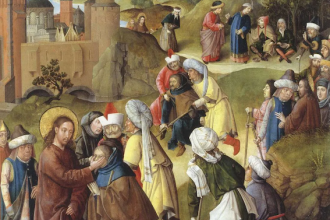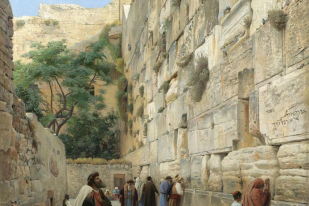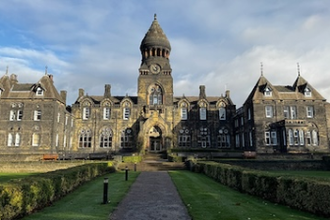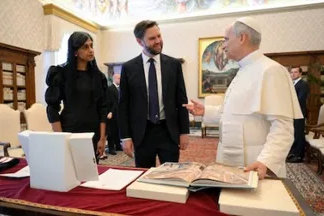Gospel in Art: Why then did you not put my money in the bank?
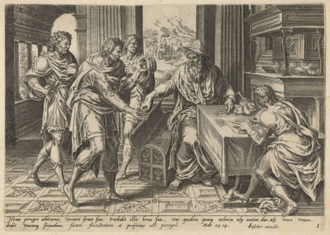
The Parable of the Talents, by Lucas van Doetechum, Engraving published circa 1565 © Wikimedia
Source: Christian Art
Gospel of 19 November 2025
Luke 19:11-28
At that time: Jesus proceeded to tell a parable, because he was near to Jerusalem, and because they supposed that the kingdom of God was to appear immediately. He said therefore, 'A nobleman went into a far country to receive for himself a kingdom and then return. Calling ten of his servants, he gave them ten minas, and said to them, "Engage in business until I come." But his citizens hated him and sent a delegation after him, saying, "We do not want this man to reign over us." When he returned, having received the kingdom, he ordered these servants to whom he had given the money to be called to him, that he might know what they had gained by doing business. The first came before him, saying, "Lord, your mina has made ten minas more." And he said to him, "Well done, good servant! Because you have been faithful in a very little, you shall have authority over ten cities." And the second came, saying, "Lord, your mina has made five minas." And he said to him, "And you are to be over five cities." Then another came, saying, "Lord, here is your mina, which I kept laid away in a handkerchief; for I was afraid of you, because you are a severe man. You take what you did not deposit, and reap what you did not sow." He said to him, "I will condemn you with your own words, you wicked servant! You knew that I was a severe man, taking what I did not deposit and reaping what I did not sow? Why then did you not put my money in the bank, and at my coming I might have collected it with interest?" And he said to those who stood by, "Take the mina from him, and give it to the one who has the ten minas." And they said to him, "Lord, he has ten minas!" "I tell you that to everyone who has, more will be given, but from the one who has not, even what he has will be taken away. But as for these enemies of mine, who did not want me to reign over them, bring them here and slaughter them before me." '
And when he had said these things, he went on ahead, going up to Jerusalem.
Reflection on the engraving
The parables of Jesus often mirror the world he lived in, using familiar situations to reveal deeper truths about God and humanity. In today's parable, a man of wealth entrusts his servants with his money before leaving for a distant country. Two of them invest wisely and make good use of what they've been given, but the third hides his share in a piece of cloth, too afraid to take a risk. His fear of losing what he had led him to do nothing at all. Jesus uses this image to challenge us: each of us has been entrusted with gifts and blessings, and God hopes we will use them well. We should not bury our talents in fear, but put them to work in ways that build His kingdom. We have to be fearless!
The fearful servant reminds us that faith is not about playing it safe. God asks us to act with trust and courage, even when we feel uncertain. Every one of us has received unique gifts, but above all, we have been given the greatest gift of all: Jesus himself. From his fullness, as St John's Gospel says, "we have all received grace upon grace." When we live out that grace in love and generosity, our lives become fruitful and alive. The Lord calls us to live boldly and letting love, not fear, shape how we use what we have received.
In Lucas Doetechum's engraving The Parable of the Talents, circa 1565, we see the seated master, beside a large chest overflowing with coins. Next to him, a scribe carefully records accounts in a ledger, a reminder that all actions will one day be reckoned. To the left of the master stand the two faithful servants, both bearded and confident, presenting the profits they have earned. Their upright postures and calm expressions reflect diligence, responsibility, and integrity. In contrast, the third beardless servant lingers in the background, hesitant and uneasy. He looks away, reluctant to face his master, the weight of fear clearly visible in his eyes. In the distance, figures plough the fields, a poetic detail that ties the parable to everyday life: just as fields must be worked to bear fruit, so too must our talents be cultivated and shared.... allowing our lives to yield a harvest pleasing to God.
LINKS
Gospel in Art: https://christian.art/
Today's Reflection: https://christian.art/daily-gospel-reading/luke-19-11-28-2025/
and
Video: The Art of Remembrance - From The Monuments Men to The Last Post: www.indcatholicnews.com/news/53644




